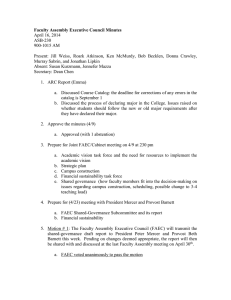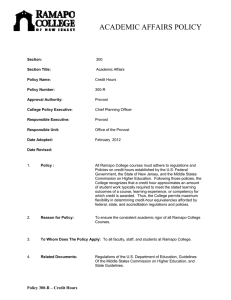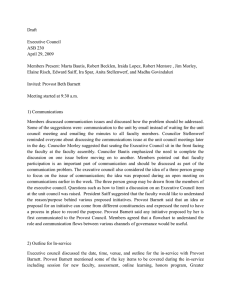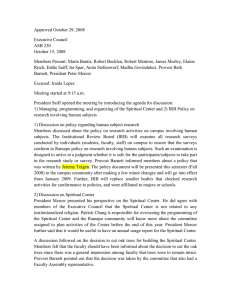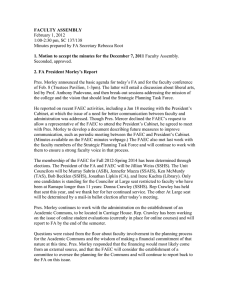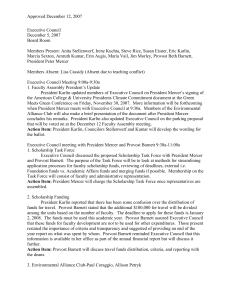March 31 , 2010 Faculty Assembly Executive Council (FAEC) Meeting
advertisement
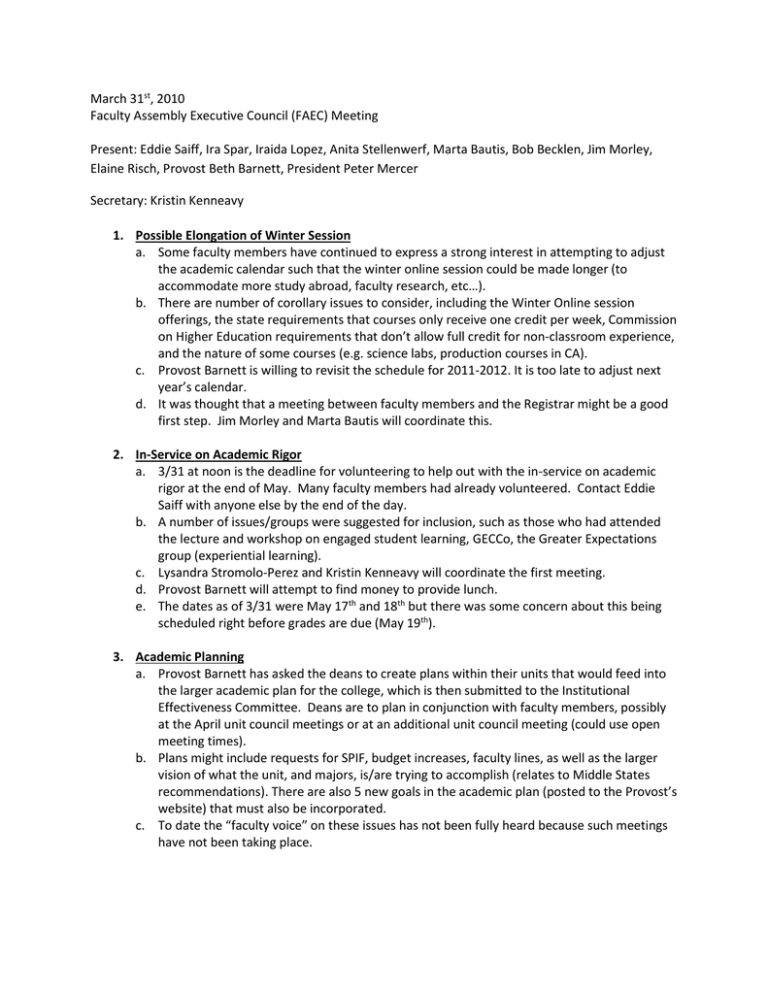
March 31st, 2010 Faculty Assembly Executive Council (FAEC) Meeting Present: Eddie Saiff, Ira Spar, Iraida Lopez, Anita Stellenwerf, Marta Bautis, Bob Becklen, Jim Morley, Elaine Risch, Provost Beth Barnett, President Peter Mercer Secretary: Kristin Kenneavy 1. Possible Elongation of Winter Session a. Some faculty members have continued to express a strong interest in attempting to adjust the academic calendar such that the winter online session could be made longer (to accommodate more study abroad, faculty research, etc…). b. There are number of corollary issues to consider, including the Winter Online session offerings, the state requirements that courses only receive one credit per week, Commission on Higher Education requirements that don’t allow full credit for non-classroom experience, and the nature of some courses (e.g. science labs, production courses in CA). c. Provost Barnett is willing to revisit the schedule for 2011-2012. It is too late to adjust next year’s calendar. d. It was thought that a meeting between faculty members and the Registrar might be a good first step. Jim Morley and Marta Bautis will coordinate this. 2. In-Service on Academic Rigor a. 3/31 at noon is the deadline for volunteering to help out with the in-service on academic rigor at the end of May. Many faculty members had already volunteered. Contact Eddie Saiff with anyone else by the end of the day. b. A number of issues/groups were suggested for inclusion, such as those who had attended the lecture and workshop on engaged student learning, GECCo, the Greater Expectations group (experiential learning). c. Lysandra Stromolo-Perez and Kristin Kenneavy will coordinate the first meeting. d. Provost Barnett will attempt to find money to provide lunch. e. The dates as of 3/31 were May 17th and 18th but there was some concern about this being scheduled right before grades are due (May 19th). 3. Academic Planning a. Provost Barnett has asked the deans to create plans within their units that would feed into the larger academic plan for the college, which is then submitted to the Institutional Effectiveness Committee. Deans are to plan in conjunction with faculty members, possibly at the April unit council meetings or at an additional unit council meeting (could use open meeting times). b. Plans might include requests for SPIF, budget increases, faculty lines, as well as the larger vision of what the unit, and majors, is/are trying to accomplish (relates to Middle States recommendations). There are also 5 new goals in the academic plan (posted to the Provost’s website) that must also be incorporated. c. To date the “faculty voice” on these issues has not been fully heard because such meetings have not been taking place. 4. Thomases’ Award Ceremony a. Takes place 3/31 at 2:30 in Pavilion 2. Bonnie Blake is this year’s recipient. b. Mostly it is an award for scholarship, but it also takes service and teaching into consideration. c. The Thomases were founding trustees of the college. 5. Academic Commons Proposal The President plans to look at this proposal at the cabinet meeting on 4/5. 6. Discussion of Middle States Findings a. Is was noted that the chair of the Middle States team was sympathetic to Ramapo’s role as a public liberal arts college and his view of Ramapo as a “young institution” was probably a helpful perspective. The chair might attempt to navigate Middle States away from a two year visit and in favor if a two-year letter. There aren’t “sanctions” per se, but Ramapo must respond to the recommendations, which are listed publically by Middle States. b. The areas of greatest concern included assessment, the liberal arts curriculum across programs, selective expansion of new programs, the lack of an all-college governing body, experiential learning, and the tension between increased academic quality and diversity. c. Assessment was probably the most pronounced concern, although the “assessment guru” on the team (Patty Francis) was of the belief that many component parts were present, they just needed to be pulled together. There is a need to motivate faculty to stay on top of this issue rather than forgetting about it for another 10 years (the likely 5-year interim visit may accomplish this). d. President Mercer will likely meet with the chair, Chris Dahl, prior to the final report being released. It was suggested that there be a faculty (and possibly staff) meeting in June after the official report is posted to discuss plans prior to the summer break. This idea needs further development; Provost Barnett will get back to Eddie Saiff on this issue. 7. Cahill Center Staffing a. Provost Barnett was asked what was happening in terms of staff vacancies at the Cahill Center. Provost Barnett responded that the Position Review Committee was waiting for a plan from the Cahill Center outlining what they would like to accomplish and what their needs include. The plan must be reviewed before positions can be filled. b. This is a concern due to their oversight of alternative Spring Break programs and some forms of experiential learning. 8. State Government and Higher Education a. The President was asked what the current thinking is regarding how the new governor may choose to deal with higher education. b. The President relayed an anecdote about state funding being abruptly taken from Thomas Edison and how this indicates the somewhat “whimsical” nature of the governor’s approach. c. The requirement that state employees live in the state is unlikely to materialize. d. President Mercer is pushing for a more equitable formula for allocating state funds to the various colleges/universities but there will be resistance from those who currently benefit from the status quo (current emphasis is on growth, which is not good for Ramapo). e. The Capital Fee will likely go through this year. The amount is modest. Potential problems are more likely to come from the Treasurer’s office than from the Governor’s office. 9. Other Points Governance Review Committee Meeting at 3 pm on 3/31. (joint meeting to come) GECCo meeting on 3/31. Photo of FAEC reps was taken. Minutes from prior meeting (3/24) approved via email.
